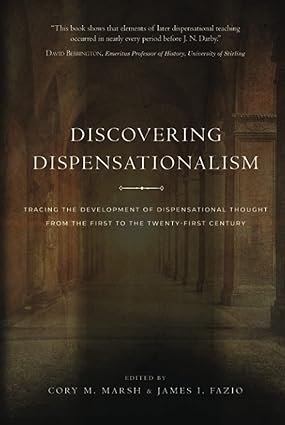A Brief Book Notice from Books At a Glance
by Fred G. Zaspel
One criticism often thrown at dispensational theology is that it is unprecedented in the history of the church. Editors Cory Marsh and James Fazio and their team of authors challenge that notion in their new book, Discovering Dispensationalism: Tracing the Development of Dispensational Thought from the First to the Twenty-First Century. It’s a needed area of study, one which critics will not want to ignore.
Watch for our upcoming review of this book. Meanwhile, below are some of the book’s endorsements and its table of contents.
Endorsements
David Bebbington
Emeritus Professor of History, University of Stirling
This analysis of the various periods of church history reveals three important truths about the theological movement called dispensationalism. First, it shows that elements of later dispensational teaching occurred in nearly every period before J. N. Darby, with his distinction between the heavenly and the earthly people of God, produced its most influential form in the nineteenth century. Secondly, it explains that the movement was far from monolithic, with commentators of contrasting schools of thought postulating different dispensations. And thirdly it stresses that dispensationalism was not only a version of apocalyptic speculation but was deeply grounded in a literal hermeneutic of Scripture. The twelve authors of the chapters, not all of whom are themselves dispensationalists, have done a service to the church and the academy by producing a resource which, though sympathetic, is not polemical.
Mark Sweetnman
Assistant Professor in English with Digital Humanities, Trinity College Dublin
The supposed novelty of dispensationalism has seemed to many of its opponents a convenient stick with which to beat its adherents. The carefully assembled essays in this collection helpfully address this important issue, painstakingly highlighting the continuities of dispensational thought with the ways in which Christians have read the Bible in every century.
H. Wayne House
Distinguished Research Professor of Theology, Law, and Culture,
Faith International University
Similar to William Watson’s Dispensationalism Before Darby, this more expansive work compellingly demonstrates that dispensational ideas have been prevalent in the church from the first century to the present. With contributions from a dozen scholars, Discovering Dispensationalism cohesively argues that dispensational viewpoints emerged from a commitment to the literal interpretation of Scripture advocated by the apostles, especially regarding the future of national Israel and the Church. I highly recommend this book as a corrective to the baseless claim that dispensational thought is a recent novelty.
Contents
Introduction
1 Correcting Age-Old Misconceptions, by Cory M. Marsh
Dispensational Thought in the Ancient Mediterranean
2 New Testament Era (AD 30–100), by James I. Fazio
3 Patristic Era (AD 100–250), by Paul Hartog
4 Nicene Era (AD 250–430), by Jeremiah Mutie
Dispensational Thought in Vintage Europe
5 Medieval Era (430–1450), by William C. Watson
6 Reformation Era (1450–1600), by Ron J. Bigalke
7 Pre-Darby Era (1600–1800), by Mark A. Snoeberger
8 John Nelson Darby (1800–1882), Max S. Weremchuk
Dispensational Thought in Modern America
9 Transition across the Atlantic (1875–1910), by Larry D. Pettegrew
10 Mid-Acts Movement (1880–1930), by Phillip J. Long
11 Golden Years of Dispensationalism (1900–1980), by Thomas Ice
12 Progressive Movement (1980–Present), by Darrell L. Bock
Conclusion
13 Retrospect and Prospect of Dispensational Thought, by Cory M. Marsh and James I. Fazio
